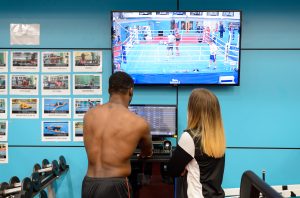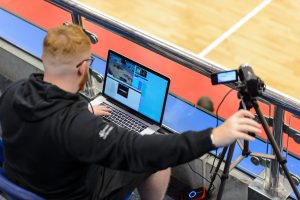Leaders: How the EIS's Performance Analysis Team is supporting athletes
Julia Wells, the EIS’s Head of Performance Analysis, discusses her team’s aim to be the best translators and visualisers of data.
This article first appeared on the Leaders in Sport website.
The English Institute of Sport [EIS] had 80 people on the ground in Tokyo providing day-to-day support to Great Britain’s athletes during the Olympic Games, with a further 40 at the Paralympic Games.
Additionally, those ground operations are supported by an eight-strong team of EIS performance analysts working out of Great Britain’s Cardiff hub at the Sport Wales Institute. The team works on Tokyo time, which is eight hours ahead of British Summer Time.
“They haven’t got a good deal this time around, I’m afraid,” says Julia Wells, the Head of Performance Analysis at the EIS. “For Rio, it was quite a convenient time difference but, this year, it’s pretty much midnight that some of them are clocking in, going right through until the afternoon, but we’ll have a rota that ensures everyone can get their rest and recovery. It’s about bolting onto those people on the ground in Tokyo and taking the weight off their shoulders”
Wells is speaking to the Leaders Performance Institute on the eve of the Olympics, with a view to providing an insight into the inner workings of the EIS Performance Analysis team.
“For data capture and analysis, we have a mantra at the EIS: ‘we should spend less time capturing data and more time analysing and feeding back’,” she continues. “That’s something that’s been rooted in us since the inception of our Performance Analysis team.”
Wells’ role encompasses governance and standards, driving the strategic direction, working with practitioners to ensure technical development on the ground, and working closely with stakeholders from 20-plus sports as well as the British Olympic Association [BOA] and British Paralympic Association [BPA].

“We have 27 analysts across 20-plus sports give or take across the cycle and around 80 percent of them will be delivering on the front line for Tokyo. For many it will be their first Games; for me, it’s my fifth Games involvement in varying capacity – so I’m definitely getting old!
“I’ll be seconded to the BOA to lead their performance analysis provision. Getting back on the frontline again is really exciting, although there a quite a lot of challenges to go through to ensure we can deliver what we need to in very different times. Teams will have more time to produce profiles on their opposition and we’ll be able to make sure they’ve got the best tactical prep.
“We’ll have coach presence with us as well. We’re not experts in all the sports so we have to make sure we tap into that. For example, sports where decisions are being made during competition can have an impact on whether you finish fourth, get on the podium, make a final, or qualify for the next round. We want to provide them with the visual insights to make the best decision.”
Wells points out that the first week in particular can be “full-on”, as she puts it. “We need to wrap a lot of people around that just to cope with the demand. Rio was about 4,000 hours of video to deal with. It’s pretty intense and if we can streamline and help them to be more effective with their decision-making then that’s the role we want to play really.”
Building relationships
As for that EIS mantra about spending less time collecting data and more time analysing and feeding back, the ability of the Performance Analysis team to focus their time is, according to Wells, a combination of their ability to harness the latest technology and, most importantly, to develop relationships with the end users.
“The software available now is immense,” she says. “There’s so much to choose from, which can be a challenge but we honed in on data visualisation and our ability to translate data into usable insights.”
The EIS’s ever-increasing capacity in data visualisation is proving to be its cutting edge. “It means we can design our own outputs, we can iterate those, we can make changes, we don’t have to wait for anyone else to make the changes because we can do it ourselves,” adds Wells. “That’s been a real key focus for the team over this cycle, to really accelerate and be the best translators of data and also the best visualisers of data. There’s so much more of that to come because we’re dealing with even more data than we have before.”
Such work is possible due to the EIS analysts embedded within the sports. “Those relationships really stand out,” says Wells. “They ensure continuing opportunities to develop our data analysis, let us be guided by the user, and also steer the direction of travel of those visualisations; what’s important, what’s not. We can be curious and ask questions of the coaches or the end user, making sure they get regular interactions to ensure it’s on track. That’s a real key component of it. Not just being an analyst behind a computer working away for weeks on end with no conversations. That’s where we see projects or visualisations not landing with the stakeholders because they haven’t been a part of the journey.
“They’ve got strong relationships and you can have really good conversations to make sure how information is being used and relayed back into training or competition for the athletes. They become fully embedded in that coaching process, they’re listening, they see the changes in the data, and they get to see it through the video. There’s no real hiding whether the information you’re providing is having an impact on the coaching process. If we can get that right, it’s pretty powerful.”

There were also opportunities afforded by the 12-month postponement of the Games. “Analysts had the time to stop and reflect, they had the time to streamline some of their processes – all of those things you don’t get to do because you’re on the road all the time or you’re in the day to day training. They were able to analyse all of the data that they didn’t necessarily have the time to analyse before.”
Strong project management skills
Wells has just completed her fifth Summer Olympic Games cycle but this was her first since being appointed the EIS’s Head of Performance Analysis in 2018. “It’s a role I’d always aspired to be in and it has been a real opportunity to challenge and develop my own leadership skills further,” she says. “Having great people around me to mentor me, both formally and informally – some of them might not have even realised they were doing it – and to guide me, or for me to ask them how they would approach my role if they were me, has been fantastic.”
Having been in position for three years, she reflects with considerable pride on her work during this elongated cycle. “It was a really good challenge to come in and build a really strong technical lead team. For me, it was always that inside battle of thinking ‘I need to be someone else’ and I learned to trust being me and being as authentic as I can be, because that’s how I will get the best out of myself in this role.
“We also have to ask ourselves how we get the best out of people – because it definitely is all about the people – in order to ensure that we’re moving in the right direction to answer valuable questions or even just lessons we can learn from if things haven’t gone as we want.”
In saying ‘we’, Wells is quick to point out that it is not just about her. “I want the same approach for any of the technical leads or practitioners on the ground. To be the best version of themselves and be comfortable being themselves. The analyst is a key member of the performance support team. It’s integral that relationships within that team are effective and productive. Of course, it depends on the question they’re trying to answer because it could be a question that one person goes away and finds those answers or they could be much bigger questions that require a wider number of stakeholders be involved, whether that’s the sporting team on the ground or external partners.
“Our analysts lead on projects all the time and so they have to develop strong project management skills and to ensure that the day to day is delivered effectively while these projects continue. We’re going into heavy competition support mode, but we’ve still got eyes on Paris.
The EIS Performance Analysis team has risen to the challenge. “As anyone who gets to work in sport always says, we feel really lucky and really proud and fortunate to be in a job that doesn’t feel like a job even though you’re working all the hours. We had a relatively young team when I stepped in, so to see individuals step into leadership roles and to see them making an impact and having so much positive feedback on what they do and contribute to the big picture is really inspiring.
“Every single one of them has developed and pushed themselves, taken on new skills. They are learning to understand themselves and work with others. To be at the cutting edge but also to be pushing themselves daily on what they do and how they provide support is outstanding.”
This article first appeared on the Leaders in Sport website.